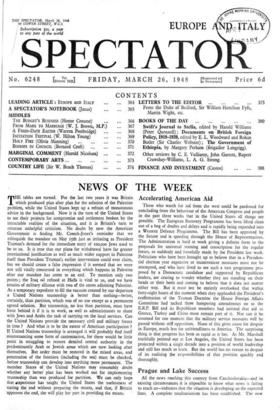Accelerating American Aid
Those who watch for aid from the west could be pardoned for concluding from the behaviour of the American Congress and people in the past three weeks that in the United States all things are possible. The European Recovery Programme has been lifted clean out of a bog of doubts and delays and is rapidly being expanded into a Western Defence Programme. The Bill has been approved by the Senate and is speeding through the House of Representatives. The Administration is hard at work giving a definite form to the proposals for universal training and conscription for the regular forces, so suddenly and forcefully made by the President last week. Politicians who have been brought. up to believe that in a Presiden- tial election year expensive or inconvenient measures must not be attempted, and who have lived to see such a vast programme pro- posed by a Democratic candidate and supported by Republican leaders, are ceasing to wonder whether they are standing on their heads or their heels and coming to believe that it does not matter either way. But it must not be entirely overlooked that within forty-eight hours of the moment when they applauded the President's reaffirmation of the Truman Doctrine the House Foreign Affairs Committee had tacked three hampering amendments on to the E.R.P. Bill and its Republican members had insisted that aid to Greece, Turkey and China must remain part of it. Nor can it be assumed for one moment that the military service measures will be passed without stiff opposition. None of this gives cause for despair in Europe, much less for unfriendliness to America. The surprising thing is that progress has been as rapid as it has. As Mr. Marshall truthfully pointed out at Los Angeles, the United States has been projected within a single decade into a position of world leadership and still has much to learn. But the world has no reason to despair of its realising the responsibilities of that position quickly and thoroughly.


































